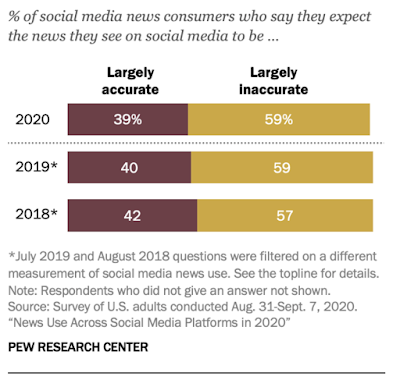There is little doubt that we live in a post-truth era, particularly when it comes to governments and their mainstream media lackeys. The reportage during the ongoing pandemic and the 2020 United States presidential election is proof that we can no longer trust the media for independent and thoroughly researched news coverage. Given these observations, in this posting, we'll look at which sources of news Americans rely on for their daily intake of events that are occurring around the world.
In mid-2020, Pew Research Center completed a survey looking at where Americans get their news. Gone are the days when families would huddle around their television set around the supper hour or just before going to bed to catch up on the day's news. According to the study from August/September 2020, the majority of Americans got their news from digital devices including smartphones, computers or tablets with a small minority getting their news from the old-fashioned print publications as shown on this graphic:
At that time, 52 percent of Americans said that they preferred a digital platform for their news with sources as follows:
This can be broken down further with preferences as follows:
1.) 26 percent preferred to get their digital news from news websites or apps.
2.) 12 percent preferred to get their digital news from search engines.
3.) 11 percent preferred to get their news from social media.
4.) 3 percent preferred to get their news from podcasts.
The preferred source of news varies with age as shown here:
Now, given the growing percentage of Americans who get their news from social media platforms, let's look at Pew's research into news use across social media platforms from early 2021. Here is a graphic that shows which social media platforms are used by Americans as a regular source of news:
As you can see, Facebook is the most used by American adults as a regular source of news. If we look at the percentage of each social media site's total number of users who regularly get news from each site, we find that Twitter is the most commonly used:
1.) Twitter - 59 percent
2.) Facebook - 54 percent
3.) Reddit - 42 percent
4.) YouTube - 32 percent
5.) Instagram - 28 percent
6.) TikTok - 22 percent
7.) Snapchat - 19 percent
8.) LinkedIn - 15 percent
9.) WhatsApp - 13 percent
10.) Twitch - 11 percent
The percentage of Americans who use social media as a news source also varies by political persuasion with more Democrats/Democrat leaners using social media than Republicans/Republican leaners:
1.) Facebook - Republican - 46 percent Democrat - 50 percent
2.) YouTube - Republican - 42 percent Democrat - 55 percent
3.) Twitter - Republican - 33 percent Democrat - 65 percent
4.) Instagram - Republican - 32 percent Democrat - 64 percent
5.) Reddit - Republican - 21 percent Democrat - 79 percent
Despite the use of social media as a news source, a very significant percentage of news consumers expect news on social media to be inaccurate as shown here:
Let's close this posting with a brief summary. Given the growing use of social media/digital platforms as a source of news and a general decline in journalistic independence and research and the general distrust in social media news accuracy, it is interesting to see that a very significant portion of American news consumers still get their daily news fix from Facebook, Twitter, YouTube and other similar sources. We all know that the technology sector generally leans fairly heavily to the left of the political spectrum, the fact that Americans rely on social media platforms for what passes as "news coverage" is particularly concerning given the growing political divide that is plaguing Washington. Additionally, it really is no surprise that Americans (and people in other nations that rely on social media for their "news") are having trouble determining scientifically-proven facts from fiction during the pandemic.










No comments:
Post a Comment